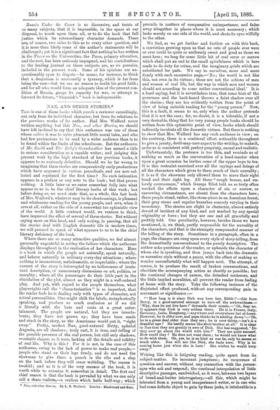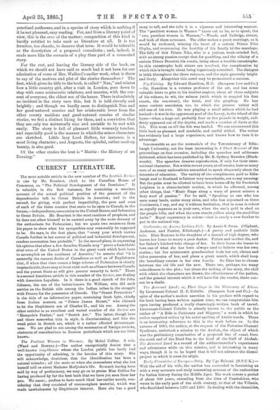NAN, AND OTHER STORIES.*
Tins is one of those books which puzzle a reviewer exceedingly, not only from its individual character, but from its relations to the previous works of its author. Had Mrs. Walford never written anything but this Nan, and other Stories, we should have felt inclined to say that this authoress was one of those whose 2nitier it was to write pleasant little moral tales, and who had few pretensions to be read by a wider audience than is to be found within the limits of the schoolroom. But the authoress of Mr. Smith and The Baby's Grandmother has earned a title to serious consideration as a capable writer; and judging this present work by the high standard of her previous books, it appears to us curiously defective. Should we be far wrong in imagining that these stories are comparatively early productions which have appeared in various periodicals, and are now collected and reprinted for the first time ? No such intimation appears in a preface or any note to the book ; but that proves nothing. A little later on we enter somewhat fully into what appear to us to be the chief literary faults of this work ; but before doing so, we must state that, as a whole, this last book of Mrs. Walford's, whatever may be its shortcomings, is pleasant and wholesome reading for the young people, and errs, when it errs at all, rather on the side of a somewhat too optimistic view of the world. A little contrast would, we venture to think, have improved the effect of several of these stories. But without saying more on this head, and only noting, in passing, that all the stories deal with English domestic life in modern times, we will proceed to speak of what appears to us to be the chief literary deficiency of the book.
Where there are so many attractive qualities, we feel almost personally ungrateful in noting the failure which the authoress displays throughout in the realisation of her characters. Here is a book in which .the people act naturally, speak naturally, and behave naturally in ordinary every-day situations ; where nothing is inconsistent, melodramatic, or improbable ; where the current of the story is interrupted by no tediousness of irrelevant description, or unnecessary discussions on art, politics, or morality ; where all the personages do their little part in the elucidation of the plot, almost as they might in a well-ordered play. And yet, with regard to the people themselves, what playwrights call the " characterisation " is so imperfect, that the reader feels he is dealing only with types of character, not actual personalities. One might shift the labels, metaphorically speaking, and produce as much confusion as if we did it literally with the hats and coats at a great entertainment. The people are natural, but they are invertebrate; they have not grown up ; they have been made and stuck in the story, as the Americans would put it, "right away." Pretty, modest Nan, good-natured Detty, spiteful Augusta, are all shadows ; truly cast, it is true, and telling of the possible presence of the real person, but still only shadows, —outside shapes, as it were, lacking all the details and solidity of real life. Why is this ? For it is not, in the case of this authoress, owing to the lack of power to make real people,— people who stand on their legs firmly, and do not need the showman to give them a punch in the ribs and a slap on the back before they will cease wobbling. The reason is twofold; and as it is of the very essence of the book, it is worth while to examine it somewhat in detail. The first and chief reason is that the book is pervaded by what we can only call a sham realism,—a realism which halts half-way ; which prevails in matters of comparative unimportance, and fades away altogether in places where it is most necessary ; which looks merely on one side of the world, and shuts its eyes wilfully to the other.
We find, as we get farther and. further on with this book, a conviction growing upon us that no sets of people ever were or ever could be quite so uniformly sweet and good as those we meet here ; we long for some little hit of real error or sorrow which shall put an end to the small spitefulness which is here made to do duty for crime, and the imaginary griefs which are substituted for paih. We say to ourselves, more and more firmly with each successive page,—'No; the world is not like this, not even in its virtues ; these are not the actions of men and women of real life, but the way in which men and women should act according to some rather conventional ideal.' It is a hard saying, but it is nevertheless true, that some hint of the governess and the back-board throws a faint shadow over all the stories ; they are too evidently written from the point of view of being suitable reading for the "young person." Now, this is a fault, it seems to us, only when the author pretends that it is not the case ; for, no doubt, it is a tolerable, if not a very desirable, thing that for very young people books should be written from this optimistic point of view, books which should indirectly inculcate all the domestic virtues. But there is nothing to show that Mrs. Walford has any such audience in view ; on the contrary, there is a continual effort noticeable throughout to give a jaunty, devil-may-care aspect to the writing, to make it, as far as is consistent with perfect propriety, casual and realistic.
Unfortunately, the pretence is too thin, and reminds us of nothing so much as the conversation of a head-master when upon' a great occasion he invites some of the upper boys to tea. It is this restraint exercised over all the sayings and doings of all the characters which gives to them much of their unreality ; it is as if the showman only allowed them to move their right hand and their right leg. All those "rough bosses, and. un lovely excrescences," which George Eliot told us so truly often marked the effects upon a character of sin or sorrow, or narrowing circumstance, are absent from the characters here ;
these people stand, rather, like stone-pines in an American forest, their grey stems and regular branches scarcely varying in their monotony. The stories are slight in character, almost entirely devoid of incident of any kind, and not marked by any special originality or force ; but they are one and all gracefully and prettily told. One peculiarity, however, besides those we have mentioned, is, we think, partly responsible for the unreality of the characters, and that is the strangely compounded manner of the telling of the story. Sometimes in a paragraph, often in a page, the changes are rung upon every style of story-telling, from the dramatically conversational to the purely descriptive. The author asks questions of the reader, or upbraids the character of whom she is speaking, and then jumps back into the dramatic or narrative style without a pause, with the effect of making us wonder uncomfortably what will happen next. The attempt, of course, is to produce the result of broken conversations, and
elucidate the accompanying action as shortly as possible; but the continual changes of person, the detached sentences, and the little implied moralities, all prevent the reader from feeling at home with the story. Take the following instance of the disjointed effect produced, without any corresponding gain in movement or significance :—
" How long is it since Dick was here last, Edith ?'—this from Detty, in a good.natnred attempt to turn-off the awkwardness.— ' Why, does be not live here F' demands their cousin.—' Oh, dear no. It appears that Dick is very seldom there. He is in France, Italy, Germany, India, Hongkong,—anywhere and everywhere but at home. However, he is older now, and papa think-a he is settling down.'—' Oh, he is a great deal older than they are ; he is over thirty,—isn't it a dreadful age ? He hardly seems like their brother at all.' It is clear to Nan that they are greatly in awe of Dick. She has suggested, Do they ever go shoat the world with him ?' They are quite amused. How could they ? He does not want them ; he would not know what to do with them. Oh, yes, he is as kind as can be, only he seems so much older. Nan will not like Dick, she feels sore. Why is he coming home just when she is here ? She wishes he would keep away."
Writing like this is fatiguing reading, quite apart from its subject-matter. Its incessant jumpiness; its recurrence of question and answer, without any connection with the personages who ask and respond; the continual interpolation of little descriptive passages, sandwiched, as it were, between two layers of bread-and-butter interrogatory,—all this, which might be tolerated from a young and inexperienced writer, or in one who had some definite object to gain by these jerks, is intolerable in a practised authoress, and in a species of story which is nothing if it be not pleasant, easy reading. For, and from a literary point of view, this is the crux of the matter; composition of this kind is hardly entitled to take rank as literature at all. It is too formless, too chaotic, to deserve that term. It would be tolerable as the description of a proposed comedietta ; and, indeed, it reads more like the scenario of a play than part of a connected story.
For the rest, and leaving the literary side of the book, on which we should not have said so much had it not been for our admiration of some of Mrs. Walford's earlier work, what is there to say of the motives and plot of the stories themselves ? The first, which gives its title to the book, is called "Nan," and relates how a little country girl, after a visit in London, goes down to stop with some aristocratic relations, and marries, with the consent of everyone, the eldest son of the house. There is absolutely no incident in the story save this, but it is told cleverly and brightly ; and though we hardly seem to distinguish Nan and her good-natured cousins and her aristocratic lover from the other county maidens and good-natured cousins of similar stories, we feel a distinct liking for them, and a conviction that they are only too universally nice and amiable to be met with easily. The story is full of pleasant little womanly touches, and especially good is the manner in which the minor characters are sketched. Little lazy Lord Helton, for instance, is a most living character ; and Augusta, the spiteful, rather used-up beauty, is also good.
Of the other stories the best is "Mettle: the History of an Evening."



































 Previous page
Previous page